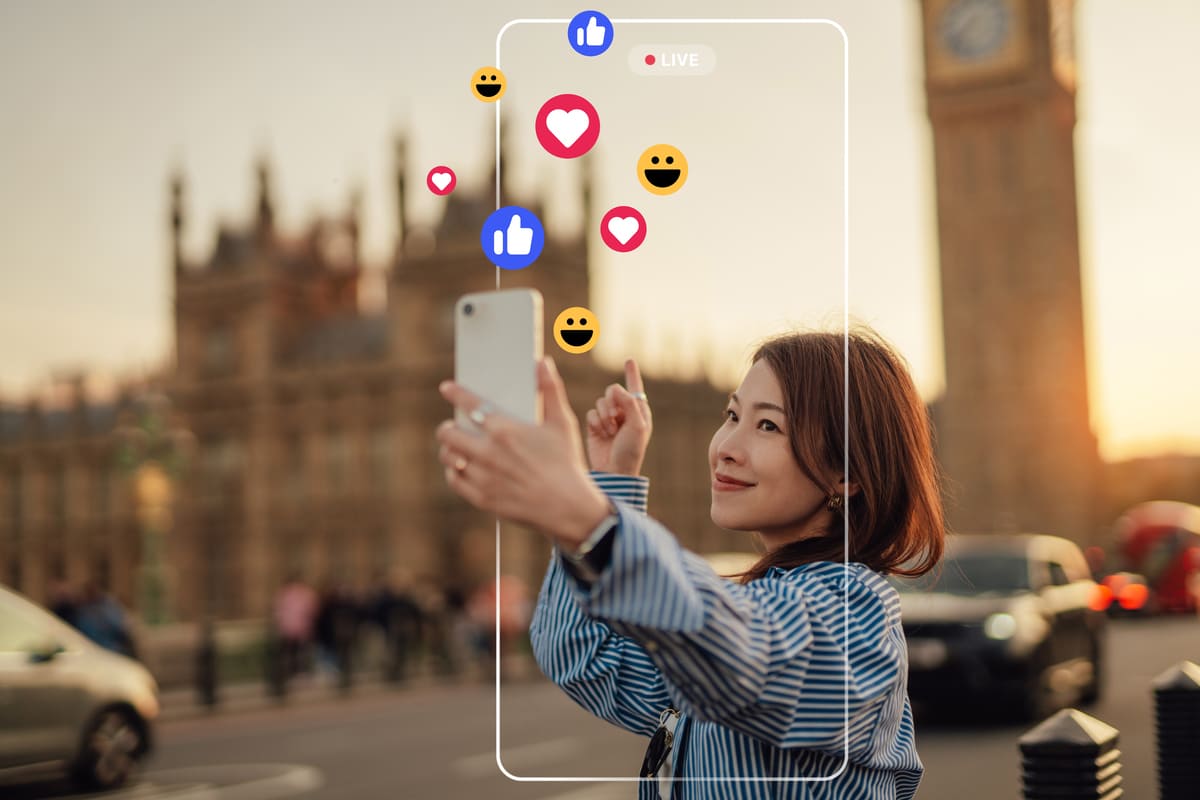Like most industries, hospitality has also been affected by digital transformation, resulting in a shift from traditional promotion methods to more innovative digital marketing strategies. This guide provides valuable insights and tips on digital marketing techniques that are effective and specifically designed for the hospitality sector. Whatever your dream career in hospitality is, knowing these marketing strategies is a great way to get ahead and ensure success.
Digital marketing strategies for the hospitality sector
To succeed in the hospitality industry it’s important to embrace and apply effective marketing tactics. A well-planned strategy not only attracts new guests, it also helps maintain strong relationships with existing customers.
There are a number of actions you should take to ensure your digital marketing strategy is effective. These apply to any industry, so they are a great place to start when looking to market a hospitality business:
- Get to know your target audience.
- Craft content that resonates with them.
- Carefully manage your reputation.
- Implement an SEO strategy to improve visibility.
- Optimize your presence on social media platforms.
By learning how to follow these marketing steps and create breathtaking marketing campaigns, you can help lead any hospitality business to success.
From branding to marketing campaigns, this degree helps you learn from the best, letting you launch a successful career in hospitality marketing, whether you want to work for high-end venues or become a marketing consultant.

Developing a digital marketing strategy
Developing a successful digital marketing strategy in the hotel and resort industry requires more than simply making a plan and carrying it out. A great hospitality digital marketing strategy hinges on truly comprehending your audience, just like in marketing for any other field. This includes knowing their specific needs, behavioral patterns and preferences. To achieve this understanding, there are two key steps involved: thoroughly studying your target audience and competitors and creating a distinctive value proposition that sets you apart. Below, we’ll go into how these standard marketing practices can be adapted for use in any hospitality industry, such as being aware of peak hospitality seasons and highlighting special offers at these times.
Analyzing the target market and competitors
To ensure a successful internet marketing strategy for a hotel, it’s crucial to thoroughly analyze your target audience and competitors. This analysis will pave the way for effective marketing tactics.
It is essential to understand your clientele to provide a guest experience tailored to their specific preferences. Are you targeting luxury travelers who prioritize quality amenities? Or do you want to target budget-conscious guests who value affordability above all else?
To understand specific needs, you can use tools such as customer surveys or data analytics platforms. These resources provide comprehensive insights into the needs and preferences of potential clients.
Creating a unique value proposition
Once you have a solid understanding of your customers and competitors, it’s time to define what makes your offering unique, that is, your Unique Value Proposition (UVP). This is particularly important if you want to start your own hotel. If you are looking to work for an existing company, they might already have a USP.
To truly stand out in the competitive realm of hospitality marketing, it’s important to develop a UVP that captures why potential guests should choose your establishment over others. This could be exceptional customer service, unbeatable location advantages or innovative amenities. Your UVP should effortlessly demonstrate what sets you apart from your competitors and highlight why guests book – or should book – with you.
Content marketing for the hospitality sector
Digital marketing for hotels is like a mosaic, made up of different pieces that come together to create a complete picture. One necessary element of this mosaic is content marketing. Hotels and other businesses in the hospitality sector can benefit hugely from using well-crafted and relevant content to attract and engage their audience.
Optimizing content for different platforms
It’s important to recognize a one-size-fits-all approach won’t succeed across every platform. Each distribution channel has its own unique characteristics and requires tailored content formatting. The first step in adapting your content to different channels is ensuring it aligns with the specific requirements of each platform. These include limitations on text length or video quality and compatibility specifications for different devices such as mobiles, tablets and desktops.
Creating engaging content
Engaging guests throughout the customer journey is essential for any innovative digital marketing strategy and particularly so in the hospitality sector. Hospitality businesses can create engagement through various forms of content, such as blog posts, graphics for social media channels or educational videos that showcase the services they offer. By using different touchpoints, you can effectively capture and maintain guest interest, leading to more direct bookings.
Email marketing for hotels
In today’s digital world, email marketing has become an essential strategy for the hospitality sector. When executed effectively, it can establish direct and consistent engagement with your customers, resulting in repeat business and cultivating customer loyalty.
Building an email list
A key element of effective email marketing is building and maintaining a targeted and up-to-date email list. To entice potential subscribers, ensure your website or hotel marketing channels prominently feature sign-up prompts. You can also provide incentives such as exclusive discounts or access to special content to encourage subscriptions.
Crafting and sending emails
After building a solid subscriber base, it’s vital to create compelling emails that align with your hotel’s digital marketing efforts, highlighting special offers or unique selling points. Remember to keep the emails concise, as many people are swamped with an overwhelming number of messages daily.
Measuring campaigns uccess
The job doesn’t end once you click ‘send’. It’s important to track performance metrics such as open rates, click-through rates (CTR) and the conversion rate, which is how many people actually follow through to the booking process. This data is crucial for improving future engagements with your subscribers by customizing content and design.
Using online reviews to improve digital marketing

Managing online reviews is another aspect of digital marketing for hotels. As part of an effective hotel internet marketing strategy, leveraging customer feedback has the potential to greatly enhance your online reputation. However, failure to manage it could have the opposite effect.
Increasing positive reviews
To encourage more positive reviews, politely request guests to share their experiences either during checkout or in post-stay follow-up emails. You should also aim to improve your overall guest experience, as exceptional service often results in enthusiastic and glowing reviews.
Limiting negative reviews
Managing negative reviews plays an essential role in the marketing strategy of hotels. It’s akin to extinguishing small fires before they become infernos. Offering easily accessible and private feedback channels can allow dissatisfied guests to express concerns without resorting to public platforms. Promptly resolving issues also discourages customers from venting their frustrations online.
Responding to reviews
An integral aspect of effective hotel marketing strategies is the strategic management of customer reviews, be they positive or negative. This approach not only conveys your appreciation for customer feedback but also signifies your dedication to enhancing guest experience based on their valued insights.
When receiving positive reviews, it is important to show gratitude towards the reviewers for taking the time to provide feedback. Additionally, make sure to prioritize future guest satisfaction and demonstrate your commitment to their experience. On the other hand, handling negative reviews requires delicacy. Express regret over any bad experiences and offer solutions or resolutions to show accountability and reassure potential clients.
Search engine optimization (SEO)
SEO plays a major role in establishing a strong online presence by helping websites appear at or near the top of organic search engine results. This higher visibility leads to increased click-through rates and ultimately drives valuable traffic to the website.
Social media strategies for hotels
Mastering social media is undoubtedly one of the most powerful digital marketing strategies for the hospitality sector. It has fundamentally transformed the way hotels connect with their customers, inspiring new bookings and re-engaging previous guests.
Developing a social media content plan
Executing digital hotel marketing without proper planning can lead to inconsistent postings and negative responses. It can also result in missed opportunities during peak periods. Having a well thought-out social media content plan can minimize such concerns. To plan effectively, you need to:
-
- Understand your audience: start by identifying who your audience is. A thorough understanding of their demographics can guide you towards creating relevant content that resonates with them. This principle holds true whether you’re looking at which distribution channel drives fast results or at general marketing strategies for hotels.
- Create a schedule: effective scheduling ensures every post receives optimal attention at the right time from your audience. Perfectly blended frequency and timing can boost engagement.
- Diversify content: offer variety, for example, by using professional photos highlighting stunning views alongside more basic behind-the-scenes shots. This approach makes viewers feel closer to your brand while adding authenticity.
- Ensure great communication: focus on the right communication for the right online platform, as well as being mindful of cross-cultural communication to attract potential customers from all over the world.
- Choose influencers wisely: influencer marketing is a recent trend that can result in more people becoming aware of your hotel business. However, like all digital marketing tools, you need to consider this carefully. Not all influencers will connect with your desired audience.
Consistent application of these digital marketing strategies for hotels can elevate how guests perceive your establishment before they even check in and maximize revenue and reputation.
Loyalty programs
Strengthening customer relationships is a foundation of good business practice. For a hotel, this can mean guest loyalty programs or upselling efforts. Both are essential elements in successful digital marketing strategies for the hospitality sector.
At its core, rewarding customer loyalty helps create brand advocates – individuals who like your offering so much they continuously return and actively endorse your establishment to everyone they know.
Data driven digital marketing strategies
Reliable data provides great insights into customer preferences, behavioral patterns, and trends – all key factors that shape your hotel’s internet marketing strategy. Customers’ tastes are not rigid and constantly evolve. It’s up to marketers to stay vigilant and adapt swiftly.
Analyzing feedback from guests can give you an understanding of which aspects of service require improvements or changes. That way, you actively improve their experience while maintaining offerings that already do well. Purposeful use of data leads to a synergy where every decision packs a punch because it isn’t just theoretical, its foundation lies in real-world experiences.
Digital marketing strategies for a luxury hotel
Luxury hotels, in particular, face the expectation of superior service and personalized experiences from their clients. In luxury management and marketing, is essential to emphasize these high-end aspects of the hotel or brand. In your digital marketing strategies, these qualities should be at the forefront of any campaign, and they should become the first thing that customers learn about your brand.
How to learn digital marketing for hospitality
If you’re interested in learning more about marketing for the hospitality industry and opening the way to a wide range of hospitality careers, there are several avenues you can explore:
- Enroll in a course
- Read articles on the subject
- Connect with a network of marketers to learn from their expertise
- Consider pursuing a degree in hospitality
- Gain internship experience to help you learn in a real-life setting
By engaging with the above learning opportunities, you can enhance your understanding of general marketing strategies for all types of hospitality venue, from B&Bs to luxury hotels.
Expand your horizons with professional internships, learn from industry-leading experts and create networks that can power your career in hospitality marketing.

Conclusion
Digital marketing for hotels and resorts is one of the many things you can do with a hospitality degree. The fast-paced digital world presents abundant opportunities for hospitality industry marketers to flourish and connect with a worldwide clientele. By incorporating effective digital marketing techniques such as SEO, harnessing the influence of social media, using online reviews to your advantage, and staying abreast of emerging trends, you can amplify your hotel or restaurant’s online visibility and entice more visitors. Want to start your hospitality career in marketing? Discover how Les Roches can help you become a leader in hospitality with our courses on hospitality management and marketing.
Photo Credit
Main Image: Oscar Wong/ Moment via Getty Images




